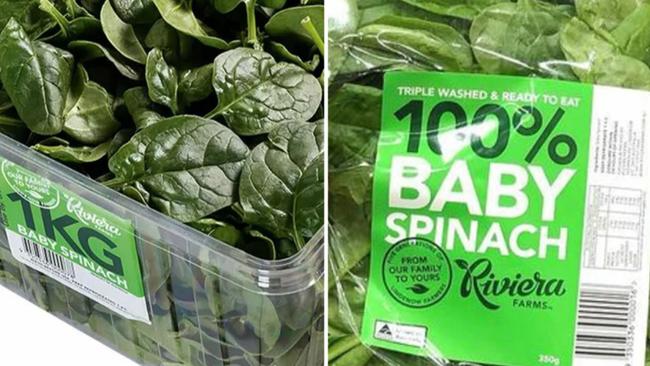Gippsland farm at centre of food poison scare
An East Gippsland farm is awaiting test results to determine the weed responsible for leaving more than 20 Victorians in hospital.
A Gippsland farm has found itself at the centre of a food contamination scare that has led more than 20 Victorians to present to an emergency department after eating its baby spinach.
The Department of Health and Agriculture Victoria are scrambling to identify the cause of the health scare that has led dozens of people across Australia to experience toxic reactions ranging from hallucinations to trouble passing urine within hours of consuming baby spinach grown by Riviera Farms at Lindenow, in East Gippsland.

This is the first time the farming business owned by the Cox family has been the subject of a health incident.
All baby spinach products with an expiry date before and up to December 28 are being recalled across Aldi, Coles, Costco and Woolworths stores.
“It appears these products, which were grown on a farm in Victoria and shipped to stores in NSW, have been contaminated with a weed which can have health consequences if consumed,” the farm said in a statement.
“Riviera Farms has been in the business of providing fresh food since the 1880s and have been saddened by this incident, which is our first in our long history.”
Samples have been sent to laboratories for testing.
The Victorian Department of Health has advised people to check the brands and batch numbers affected.
“These baby spinach products are not safe to consume and should be discarded or returned to the place of purchase for a refund,” a departmental spokesman said.
The incident is the latest food contamination scare to rock Australians, following poppy seeds containing the naturally occurring but poisonous chemical thebaine in November.
Australia was rocked by two food scandals in 2018 when needles were found in strawberries, leading to the loss of $160 million worth of the fruit that had to be destroyed, and a fatal listeria outbreak linked to a NSW rockmelon grower.
Vegetable farmers are urging Australians to continue purchasing leafy greens on supermarket shelves without fear of contamination, as other growers become collateral damage in the incident.
“We have spoken to growers who have experienced reduced orders and drops in sales who are not even in the same state as the source of the recalled spinach, which is an avoidable situation that hurts the entire industry,” Michael Coote, chief executive of peak industry group AUSVEG, said.
“Vegetable growers were hopeful that a busy and productive Christmas and festive season would be a buoyant finish to what has been the hardest year for vegetable producers in recent memory.”





